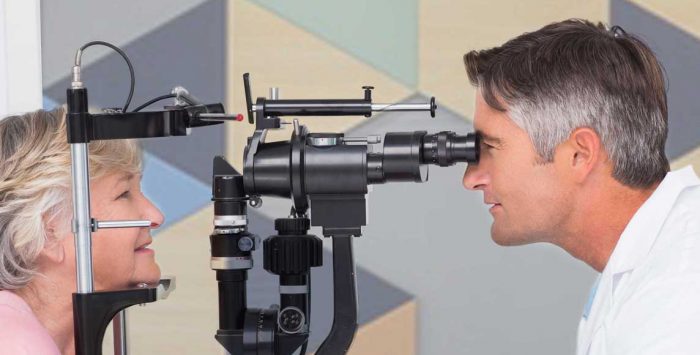How does Medicare cover vision services and treatment?
Original Medicare won’t pay for routine vision services, but it will cover the cost of diagnosing and treating most eye diseases and conditions. Most Medicare Advantage plans do include coverage for routine vision services like eye exams and glasses or contacts. They will also cover treatment for eye diseases and conditions, although the out-of-pocket costs can vary considerably depending on the specific plan.
This FAQ addresses the specifics of Original Medicare coverage, since it’s the same for all beneficiaries. But it’s also important to note that supplemental coverage – provided by Medigap, Medicaid, or an employer-sponsored plan – can result in two Original Medicare beneficiaries having very different out-of-pocket costs when all is said and done.
Does Medicare cover routine vision services?
Original Medicare won’t pay for routine vision services like eye exams, prescription glasses, or contact lenses. But there’s an exception to this if you’ve just had cataract surgery. In that case, Medicare Part B will cover some of the cost of a single pair of glasses or set of contact lenses (see below for more about how Medicare covers cataracts). And if you have a medical condition (i.e., not just a need for corrective lenses) that requires custom eyeglasses or contact lenses, Medicare might pick up the tab.
On the other hand, most Medicare Advantage plans tend to cover standard vision testing, as well as glasses or contacts. If you’re going to stick to Original Medicare but want coverage for routine vision services, Medicare supplement insurance (Medigap) won’t solve that problem, since Medigap plans won’t pay for vision care or eyeglass benefits, either. But if you have maintained supplemental coverage from a current or former employer, that coverage might include vision benefits. So be sure you understand any benefits you might have before you pay full price for eye exams and corrective lenses.
Will Medicare cover treatment for glaucoma?
Glaucoma is a disease that damages the optic nerve, potentially resulting in vision loss. Medicare Part B will cover annual glaucoma screenings for those considered high-risk, including diabetics and older Americans with a family history of the disease. African Americans aged 50 and older, and Hispanic individuals aged 65 and over are also considered high-risk.
You’ll still be responsible for your Part B deductible and if you’ve already met the deductible, 20% of the cost of your exam. (The Part B deductible is $283 in 2026. The Part B deductible only has to be paid once per year; if you’ve met it earlier in the year for other outpatient services, you’ll just pay the 20% coinsurance for Part B services for the remainder of the year).
Glaucoma treatment is generally covered under Medicare. Outpatient laser surgery falls under Part B, and eye drops to address the condition fall under Medicare Part D. Your out-of-pocket costs associated with your drops will depend on your Part D plan’s formulary.
Because Medicare Advantage is required to provide coverage for the conditions that are covered by Original Medicare, it also covers glaucoma screenings and treatment. But because Medicare Advantage plans can design their own benefits, the out-of-pocket costs can vary considerably from one plan to another.
Medigap, meanwhile, can cover some or all of the costs associated with your glaucoma screening and treatment under Original Medicare by picking up the tab for your deductibles and coinsurance. And if you have supplemental coverage provided by an employer, your out-of-pocket costs will depend on the specifics of the plan.
Does Medicare cover diabetic retinopathy?
Diabetic retinopathy can damage blood vessels in the eye, causing vision problems and loss. In fact, it’s the leading cause of blindness in the United States. If you’ve been diagnosed with diabetes, Medicare Part B will pay for one eye exam per year to get ahead of potential eye problems. You’ll still pay 20% of the Medicare-approved amount for your exam, and your Part B deductible will apply if you haven’t met it yet.
Treatment is often addressed at targeting the underlying condition – diabetes – and Medicare will provide coverage for the medical care necessary to treat diabetes. The Inflation Reduction Act – passed in 2022 – limits insulin copays to $35 per month for Medicare Part D beneficiaries.
As is the case for other services, a Medigap plan can pick up some or all of the cost of the Part B deductible and coinsurance related to diabetic retinopathy testing, depending on the Medigap plan you have. And if you have a Medicare Advantage plan, your costs will depend on the plan’s benefit structure.
Will Medicare cover macular degeneration?
Age-related macular degeneration (AMD) is the leading cause of vision impairment in adults 65 and over. Medicare Part B will cover diagnostic tests and treatment for AMD, which may include drops or eye injections.
As is the case with other covered services, you’ll still be responsible for 20% of the cost of your services or treatment after meeting your deductible, although a Medigap plan will cover some or all of those costs. Medicare Advantage will cover diagnostics and treatment for AMD as well, although as is the case with other services, the out-of-pocket costs will vary by plan.
Does Medicare cover cataract surgery?
Cataracts cloud the lens of the eye, making it difficult to see. Surgery is generally needed to correct the condition, although mild cataracts might not require surgery. If your doctor only recommends corrective lenses without surgery, the same parameters described above would apply (i.e., Original Medicare would not cover the cost of the new glasses, although most Medicare Advantage plans would cover at least some of the cost).
But assuming you need cataract surgery, Original Medicare will cover most of the cost. Cataract surgery is almost always an outpatient service, so it’s covered under Medicare Part B. That means you pay the Part B deductible (unless you’ve already paid it earlier in the year) and 20% of the rest of the Medicare-approved cost for the cataract surgery. (If you need inpatient surgery, Medicare Part A would be used; the Part A deductible is $1,736 in 2026. Any physician services received while you’re admitted to the hospital would be billed under Part B however, with the normal Part B deductible and 20% coinsurance.)
Additionally, Medicare Part B will pay for a pair of corrective eyeglasses or contacts that are necessary following cataract surgery, with you paying the normal 20% coinsurance that applies to all services covered under Part B.
Depending on your vision needs, you may be offered upgraded intraocular lenses that will correct your vision as well as eliminate the cataract. If you choose this option, you have to pay the additional cost yourself, but Medicare will still pay the amount it would have paid for you to have basic intraocular lenses inserted during the cataract surgery.
As is the case with other medical procedures, you’ll still be responsible for your Part B deductible for cataract treatment (if you haven’t already met it earlier in the year) and 20% of the rest of the Medicare-approved cost for the treatment. If you have a Medigap plan, it can pick up some or all of these out-of-pocket costs. And if you’re on Medicare Advantage, your out-of-pocket costs will vary depending on what plan you have.
Will Medicare pay for treatment for a detached retina?
A detached retina can cause permanent vision loss if not treated quickly. Medicare will cover surgery (generally outpatient) to repair a detached retina, but you’ll be responsible for your Part B deductible (assuming you haven’t already met it earlier in the year) and 20% coinsurance, which Medigap can help take care of.
Depending on where you have your procedure, a copayment might apply as well. Similarly, Medicare Advantage will cover retina surgery to preserve vision, although your out-of-pocket costs will depend on your plan.
Does Medicare cover dry eyes and allergies?
Though having dry eyes won’t necessarily impact your vision, it can be a painful condition that affects your quality of life.
Medicare will generally cover an exam to diagnose the problem since it’s not considered “routine,” at which point you’ll be on the hook for 20% coinsurance after you’ve met your Part B deductible. Your Part D plan might also cover medication to treat the condition, though in some cases, over-the-counter treatment will suffice.
You’ll get similar coverage with a Medicare Advantage plan (albeit with different out-of-pocket costs), and Medigap can help with your out-of-pocket costs if you have Original Medicare.
Will Medicare cover treatment for eye injuries?
Like excessive dryness, eye injuries aren’t considered “routine,” and are therefore eligible for coverage under Medicare, subject to the usual Part B deductible and 20% coinsurance (Medigap can help to cover these costs). Medicare Advantage will cover treatment for eye trauma as well, although out-of-pocket costs will depend on the plan’s benefit structure.
Don’t get shortchanged
Knowing what vision services you’re entitled to under your Medicare coverage will ensure that you get the care you need. Though Original Medicare won’t pay for routine eye care, it will pay to diagnose and treat a number of dangerous conditions that could compromise your vision.
Maurie Backman has been writing professionally for well over a decade, and her coverage area runs the gamut from healthcare to personal finance to career advice. Much of her writing these days revolves around retirement and its various components and challenges, including healthcare, Medicare, Social Security, and money management.









